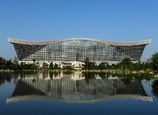
The global economic system has become a dual-cycle economic system, as China has already become a significant engine for global economic growth and also actively participated in the building of the global economic order.
There is a circular system between China and the developed countries, including industrial division, trade, investment and capital inflows, and China has built a circular economic system with developing countries through trade and direct investment. The two systems are not separate, as China links both together.
A dual-cycle economic system with two engines can maintain the smooth operation of the global economy, even when the US engine "breaks down". That's why the emerging economies can keep strong growth, despite the financial crisis causing recession and slowdowns among developed countries.
In a dual-cycle global economic system, China, as a hinge linking both the developed and developing economies, can realize the "rebalancing" of the global economy. Specifically, the developed countries need China's huge market and strong manufacturing capacity, and the mature industrial system in China can help more developing countries to realize re-industrialization, since many of them still cannot meet the investment needs and requirements of high-tech from developed countries in the short term.
China cooperates well with other developing countries in Asia, Africa and Latin America, which means they are very complementary in development. China can also realize its industrial upgrading and structural adjustment through the process of promoting other developing countries' development. As the world factory, China not only provides products for Western countries, it also offers made-in-China goods to other developing countries. Driven by China, the trade conditions of other developing countries have largely improved, and their urbanization and industrialization have been rapidly promoted. Meanwhile, their progress also provides resources and markets that boost China's economy.
Now China has a key position in the dual-cycle world economic system, it must carefully deal with some relationships when realizing its own development. Not only should it carefully deal with the "vertical competition" with developed countries, it should also better handle the "horizontal competition" with developing countries at a similar development level as China. More importantly, China should carefully manage the "relevant competition" with those developing countries which have a relatively lower development level compared to China. Although there may be some conflicts, the developing countries should help each other to realize common development in the future.
The author is a researcher and executive vice-president of the Institute of China Development Bank.

















 Kids in quake-hit Lushan mark children's day in makeshift houses
Kids in quake-hit Lushan mark children's day in makeshift houses


![]()
